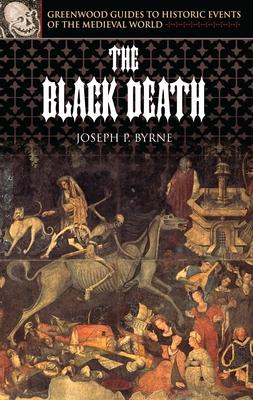Probably the greatest natural disaster to ever curse humanity, the Black Death's lethality is legendary, killing between a quarter to over half of any given stricken area's population. Though historians suspect a first wave of bubonic plague struck the Mediterranean area between 571 - 760 C.E., there is no doubt that the plague was carried west by the Mongol Golden Horde in the late 1340s as they raided as far west as Constantinople, where it is believed that Genoese traders became infected, and then carried, the disease into European and northern African ports after their escape. Within about two years practically the entire European continent and much of North Africa had been burned over by this disaster of apocalyptic proportions.
Eight thematic chapters guide the reader through the medical perspective of the plague-- medieval and modern--and to the plague's impact on society, cities, individuals, and art of the time. Medieval doctors named miasmatic vapors--bad air --as a primary cause of infection, along with an improper balance of the four Humors--blood, phlegm, black bile and yellow bile, often caused by ominous astrological alignments; or so they believed. Scapegoats, often Jews, were persecuted and murdered as frightened people desperately sought somebody to blame for the spread of the plague. Others assumed the plague was God's punishment of wicked humanity, and roamed the countryside in groups that would flagellate themselves publicly as an act of atonement. An annotated timeline guides the reader to the key events and dates of this recurring disaster. Nine illustrations show how artists represented the plague's impact on the self and society. Twelve primary documents, half of them never before translated into English, come from eyewitnesses ranging from Constantinople, Damascus, Prague, Italy, France, Germany, and England. A glossary is provided that enables readers to quickly look up unfamiliar medical and historical terms and concepts such as Bacillus, Verjuice, and Peasants' Revolt of 1381. An annotated bibliography follows, divided by topic. The work is fully indexed.
Probably the greatest natural disaster to ever curse humanity, the Black Death's lethality is legendary, killing between a quarter to over half of any given stricken area's population. Though historians suspect a first wave of bubonic plague struck the Mediterranean area between 571 - 760 C.E., there is no doubt that the plague was carried west by the Mongol Golden Horde in the late 1340s as they raided as far west as Constantinople, where it is believed that Genoese traders became infected, and then carried, the disease into European and northern African ports after their escape. Within about two years practically the entire European continent and much of North Africa had been burned over by this disaster of apocalyptic proportions.
Eight thematic chapters guide the reader through the medical perspective of the plague-- medieval and modern--and to the plague's impact on society, cities, individuals, and art of the time. Medieval doctors named miasmatic vapors--bad air --as a primary cause of infection, along with an improper balance of the four Humors--blood, phlegm, black bile and yellow bile, often caused by ominous astrological alignments; or so they believed. Scapegoats, often Jews, were persecuted and murdered as frightened people desperately sought somebody to blame for the spread of the plague. Others assumed the plague was God's punishment of wicked humanity, and roamed the countryside in groups that would flagellate themselves publicly as an act of atonement. An annotated timeline guides the reader to the key events and dates of this recurring disaster. Nine illustrations show how artists represented the plague's impact on the self and society. Twelve primary documents, half of them never before translated into English, come from eyewitnesses ranging from Constantinople, Damascus, Prague, Italy, France, Germany, and England. A glossary is provided that enables readers to quickly look up unfamiliar medical and historical terms and concepts such as Bacillus, Verjuice, and Peasants' Revolt of 1381. An annotated bibliography follows, divided by topic. The work is fully indexed.Hardcover
$67.78